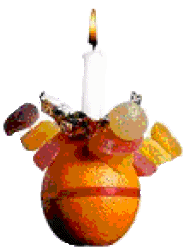MYSTERIES, LEGENDS AND RELIGIOUS FACTS ABOUT XMAS
INTRODUCTION
Christmas is a holiday that is celebrated by people from all walks of life. The period known as Christmas, started off as a religious holiday. However, as time has progressed over the centuries, Christmas has become more of a habit that people partake in for pleasure, than give thought to the religious aspect and its origin. The majority of us know the 25th of December was a chosen date by Christians to celebrate the birth of their saviour, than an actual date of Jesus Birth. However how many of us wonder why Christians chose that date, than argue date discrepancies. Why do we do certain customs during this period and where do they stem from.
The first recorded Christmas celebration was in Rome in 336AD. Then Pope Julius I made that the official Christmas date several years later. The holiday fell during winter for all of Europe. December 25th was the date of the winter solstice on the Roman calendar. Winter solstice was a day known as the shortest day with lesser light. In the 17th century, Isaac Newton would argue that the date of Christmas was selected to correspond with the solstice. The rival "History of Religions" hypothesis suggests that the Church selected December 25th date to appropriate festivities held by the Romans in honour of the Sun god Sol Invictus.
Hanukkah, is a Jewish festival. Jesus was a Jew. Hanukkah is observed for eight nights and days, starting on the 25th day of Kislev according to the Hebrew calendar, which may occur at any time from late November to late December in the Gregorian calendar. It is also known as the Festival of Lights and the Feast of Dedication. Because the Jewish calendar is lunar (it uses the moon for its dates), Kislev can happen from late November to late December.
Over the centuries different countries have adopted numerous customs that is associated with the Christmas festivities. However, many argue now, that Christmas is more commercial and furthermore away than its original meaning. Christmas over the centuries has altered, people perceptive on this period differs. Many chose not to relate Christ to Christmas and may use this time to have time with loved ones. Many chose not to participate at all. Rituals family’s do at Christmas can be a stress than a pleasure. To some, they are charitable for this one day and then revert back their chosen way of thinking not long after the festivities. To some Christmas can be a very lonely time. Christmas period brings different thoughts and emotions depending on what you believe and what customs you chose to do. How many of us give thought and respect to other peoples customs and choices, than mock and judge and even be offended by indifference in ways. Do we ever challenge ourselves first, in what do we think and believe about Christmas, or do we do it to please others as it’s the norm now or this is something we do because we believe in it and its make us feel good.



TRADITIONS AND CUSTOMS IN CULTURES AT CHRISTMAS











HISTORICAL EVENTS AND FACTS THAT HAPPENED IN THE CHRISTMAS PERIOD


-
In 800AD on 25th December, was the Coronation of Charlemagne as Holy Roman Emperor in Rome.
-
, Norway, Finland, Bosnia, and Croatia.
-
William the Conqueror Chose the 25th of December, for the date of his coronation in 1066.
-
In 1126, King Henry the 1st of England, announced the accession on his death to go to his daughter, Matilda. Matilda is the mother of Henry II of England, the first Plantagenet King.
-
In 1377, King Richard II of England hosted a Christmas feast at which twenty-eight oxen and three hundred sheep were eaten.
-
King Henry III of Castile died on the 25th of December in 1406.
-
Plough Monday, was a day that dates back to the 14th century, which resumption of work after the Christmas period. It was usually the first Monday after the twelfth day (Epiphany). Most farmers would take it in turns to use a communal plough which was often kept in the church during the Twelve Days of Christmas. Often, a plough light would be kept burning before the Sacrament or Rood until Plough Monday In 1538, Henry the VIII banned the plough light in churches and ten years later Edward VI banned the Plough Monday festivities completely.
-
Henry IV of England staged an elaborate joust on the tourney grounds at Eltham Palace for Emperor Manuel II of Constantinople. in 1400.
-
In 1492, Christopher Columbus' flagship the Santa María runs aground and sinks on Hispaniola
-
Between 16th and the 17th century, Protestant people began to change the dates in which they gave gifts from the 6th of December to the 24th December, at the time the gift giving was called Christkind.
-
The first recorded Christmas in Japan was a Mass held by Jesuit Missionaries in Yamaguchi Prefecture in 1552.
-
In 1532, Anne Boleyn was queen in all but name, presiding over the court festivities with such spectacular excess that temporary kitchens had to be erected on the palace grounds. There has been some speculation that Elizabeth I was conceived while Henry and Anne were making merry that year.
-
Until 1541, there wasa custom called “The Boy Bishop”. In England the boy bishop was elected on 6 December, the feast of Saint Nicholas, the patron of children. The real Bishop would, symbolically, step down ("he hath put down the mighty from their seat"), and the boy would take his seat. After the election, the boy was dressed in full bishop's robes with mitre and crozier and, attended by comrades dressed as priests, made a circuit of the town blessing the people.King Henry the VIII, banned this custom and when his daughter became Queen, Mary the 1st, she revived it. However Queen Elizabeth 1st then Abolished it for good.
-
In 1559, on Christmas day, Pope Pius IV was elected
-
Until 1560, in Scotland Christmas was called the “Yule”, or ("Yule time"). A 1640 Act of the Parliament of Scotland abolished the "Yule vacation and all observation thereof in time coming". Christmas in Scotland, Christmas Day only became a public holiday in 1958, and Boxing Day in 1974.New Year or Hogmanay the Scots word for the last day of the year, is a more larger celebration in Scotland.
-
Margaret of Austria, Queen of Spain was born in 1584 on Christmas day
-
In 1607, King James I insisted that a play be acted on Christmas night and that the court indulge in games.
-
In 1620, the puritan in the “The Plymouth colony” expressed their hatred for Christmas day, by spending the whole day working building their first structure in theNew World.
-
In 1634. Letttice Knollys died on December the 25th. Lettice was the cousin of Elizabeth the 1st of England and had been lady in waiting to Queen Elizabeth. She was also the second wife of the Queen’s known favorite Robert Dudley.
-
Sir Isaac Newton, English physicist and mathematician was born on the 25th December in 1642.
-
During the 17th century, the parliament under Oliver Cromwell, tried to ban Christmas. The puritans of the time believed it was pagan and popish. Christmas was illegal to celebrate for nearly fourteen years which became illegal after the execution of Charles the 1st of England.
-
William Cavendish, 1st Duke of Newcastle. solider and famous politician died in 1676, on this day.
-
In Sweden they celebrate the 13th of December as part of their Christmas customs as “Saint Lucy’s day”. This signaling the arrival of Christmastide, pointing to the arrival of the Light of Christ in the calendar, on Christmas Day. St Lucia was a young Christian girl who was martyred, killed for her faith, in 304. Lucy would bring food secretly to the Christians in Rome who were on hiding. She would wear candles on her head so she had both her hands free to carry things. Lucy means 'light' so this is a very appropriate name. St. Lucia's Day is now celebrated by a girl dressing in a white dress with a red sash round her waist and a crown of candles on her head. Small children use electric candles but from about 12 years old, real candles are used. This custom began in around the 18th century . St Lucia's Day is also celebrated in Denmark
-
On the night of December the 25th, 1776, George Washington launched a daring attack on a Hessian garrison in Trenton.
-
From 1834, Christmas became an official holiday in the United Kingdom.
-
Charles Dickens wrote “Christmas Carol” in 1843.
-
After the American Revolution, English customs fell out of favour, including Christmas. In fact, Christmas wasn’t declared a federal holiday until June the 26th of1870.
-
Boxing day become an official holiday in 1871.
-
In the 19th Century, many felt Christmas was declining. Charles Dickens was one of several writers who sought to restore it. His novel A Christmas Carol was significant in reviving merriment during the festival.
-
References of the Birth of Jesus in the bible Matthew 1:18-2:2, Luke 1:5-2:21

HISTORY OF CHRISTMAS CAROLS





